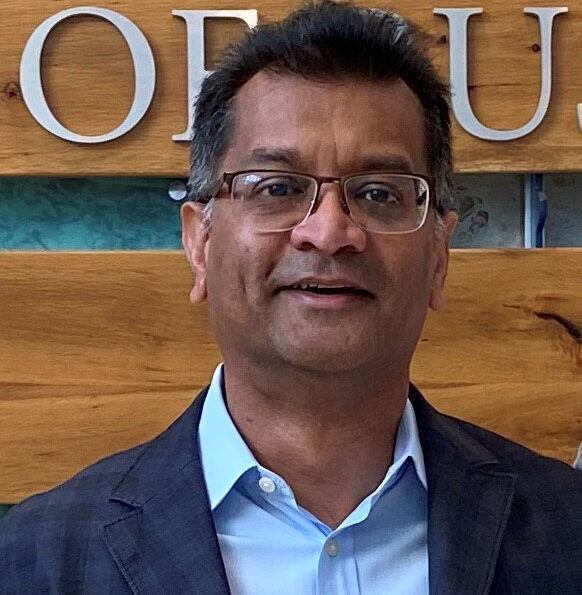Solutions expert

“Technology should translate to better patient care,” insists Raja Talati ’14 MS HI—especially as the world grapples with the COVID-19 pandemic.
And Talati is well-equipped to do it.
He is a physician, teacher, researcher and medical information officer who is also chief of aerospace medicine in the Air Force Reserve at MacDill Air Force Base in Tampa, Florida.
He has a master’s degree in health informatics from UIC and an MBA in health care analytics from University of South Florida.
As a primary care physician, he has practiced in many different settings: urgent care, juvenile detention, multidisciplinary outpatient clinics and now, during the pandemic, in hospitals.
In April, he served a two-month deployment at Jacobi Medical Center in the Bronx, where he and his Air Force team helped care for coronavirus patients. In July, he was granted privileges at a hospital near his practice in Ft. Pierce, Florida, to help with the surge of COVID-19 patients.
Everywhere Talati practices, he sees problems with potential technology solutions.
“IT can and will help make health care better, but we haven’t found that sweet spot yet,” he says.
For instance, there’s telehealth, “certainly the wave of the future,” he says.
Talati was a proponent of telehealth long before the pandemic. Months before, he had implemented telehealth at Midway Specialty Care, a nonprofit practice for HIV and other infectious diseases where he is a clinician and chief medical information officer.
“I pushed for telemedicine a long time ago. We were already on board,” he says.
Talati is collaborating on a study with University of Miami researchers to see if telehealth can be used to monitor HIV patients, decreasing the frequency of their in-person clinic visits.
“With telemedicine, access to care is going to improve. However, the underserved population will still have difficulties because of lack of access to internet,” he says, wondering aloud how internet providers could be persuaded to help.
Midway has 11 offices in Florida and one in Guyana, so Talati says it was essential to build unified communication and administrative systems.
“Getting information from Point A to Point B is still a problem in medicine,” he says.
Among his many current projects, he’s adapting a dashboard app to track data from a variety of sources to identify the areas where HIV is not well-controlled—where community outreach and Midway’s mobile HIV testing unit are most needed.
He’s working on an electronic medical records system designed for infectious disease care. He’d like an EMR system that helps track the social determinants of health.
“Some EMRs are not geared towards taking care of patients, they’re geared toward taking care of billing,” he says.
He selected an artificial intelligence dictation program for the physicians where he practices, because typing notes during a patient visit is one of his pet peeves.
“The information that gives us the diagnosis 90 percent of the time is lost if we don’t make eye contact,” he says.
“Clicking boxes does not give you a good patient history.”
Although much of his time is spent developing health care technology, Talati is adamant that he continue to see patients.
“I’ve been in practice for 20 years, I don’t want to lose my clinical skills,” he says.
As chief of aerospace medicine at MacDill, he travels to Tampa one weekend a month to conduct health screenings of reserve flight crew members. At the Midway clinic in Fort Pierce, he provides primary care to HIV patients as well as geriatric patients from his previous practice.
When COVID-19 increased dramatically in Florida recently, he began seeing coronavirus patients, sharing with colleagues what he learned during his two-month assignment in New York.
“Our inpatient providers are just exhausted,” he says. “I saw their frustration and saw they needed a bit of help.”
During his time at the Bronx hospital, Talati saw another unmet need: better communication with patients who don’t speak, or understand, English. He started strategizing IT solutions.
“There’s a telephone language line in every room, but what’s lost in translation are the social and cultural nuances of health care,” he says.